![]()
HeelBoyHeel is reader supported. When you buy through any link on our site, we may earn an affiliate commission, but never at any extra cost to you.
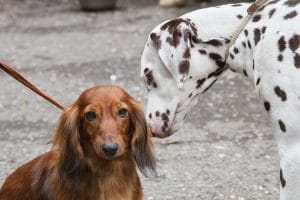
Whether you have a young pup or an older dog, you will want your dog to be social with other dogs and people.
It will be easier to socialize a puppy with other dogs as he or she will have just left a litter. An older dog may have been isolated from contact with other dogs and so this may take a little longer. However, both are achievable with a bit of work from you.
A puppy from a reputable breeder will have started to learn socialization skills with people already. Depending on previous circumstances, some puppies and older dogs are naturally wary of meeting new people.
Your job is to help your puppy or dog to be confident when meeting new dogs and humans. This will make both of your lives a lot easier and happier. Here are some tips and ideas so that you can achieve this.
1. Daily Walk In Different Locations
The daily walk can turn into a lesson in social skills for both of you! Dog owners are usually sociable and happy to discuss their dog with anyone who is willing to listen, giving your dog and theirs a chance to say hello and have a good sniff.
However, your dog or puppy may not be confident with new people and dogs and this can result in aggressive behaviour or reluctance to go near them. Pulling on your dog’s leash and shouting is not going to help with this problem, in fact it is going to make the situation worse. Instead, talk to your dog to get his or her full attention and remove your dog from the situation. Once your dog has calmed down, use a dog treat as a positive reward.
By varying the location of the daily walk, both of you will get used to seeing and meeting a wide variety of people and dogs. This again helps with your dog’s social skills and confidence.
2. Arrange To Meet With Friends Or Family Who Have A Dog
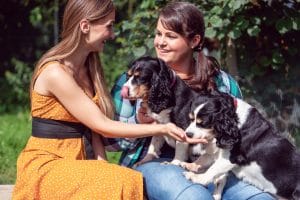
This is a very good way to socialize your dog. Your dog will be watching your reaction when meeting someone new for the first time. So, meeting a friend or a member of your family will be a positive experience for your dog and give him or her a good idea of people.
Firstly, ascertain that the dog you are arranging to meet has positive social skills! It is best that your dog and your family or friend’s dog are roughly the same size and age. A big old Labrador might not appreciate the attention of your Jack Russell puppy, for example.
Arrange to meet in a secure area with plenty of space to give the dog’s a chance to meet properly without a leash. Either both dogs need to be on a leash or both not, so that one does not have an advantage over the other. Take into account that some dogs are very protective over their own space and will not tolerate a new come straight away, so arrange the meeting accordingly.
Give the dogs enough time to get to know each other, at the same time as watching for any signs of imminent problems. This does not want to turn into a negative experience for your dog.
3. The Dog Park
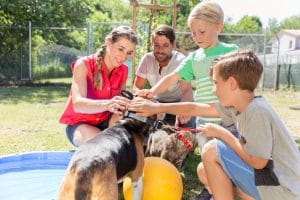
Another good way to help your dog become more social with other dogs and humans is a dog park, especially if the previous point is not an option for you both.
A dog park is an enclosed area where dogs, without leashes, can play together and get used to being around unfamiliar people. It also provides you with an opportunity to discuss your dog and theirs with other dog owners.
There are basically two types of dog park, public and private. A public dog park is run by the local council or authority and is usually situated inside a larger park. A private dog park may be attached to a housing development for example and is being run for profit, so you will need to pay. Usually there are staff on hand in the private dog park. Your dog will need to be up to date with vaccinations, worming procedures, etc. for both settings.
Sounds great! However, a young puppy or nervous adult dog may find this prospect pretty overwhelming in the beginning. If this is the case, start by walking with your dog at a distance from the dog park so that he or she gets used to the sounds, smells and sights. As your dog becomes more relaxed in the proximity of the dog park, start to get closer until your dog is happy to be up against the fence of the area and can really see what is going on. Remember to reward your dog with fuss and treats as his or her confidence increases. Now you are both ready to go into the dog park and socialize!
Although some dog parks do allow children in, it is not always a good idea. You will have to watch your dog and also a child to avoid negative experiences for all concerned!
4. Learn To Understand Your Dog’s Behaviour
Having a dog is a learning process for both of you. The sooner you understand how your dog reacts in situations, especially new situations, the sooner you will be able to help your dog avoid undesirable behaviour.
By being aware of when your dog’s comfort level is being stretched you will be able to slow the socialization process down. The most important relationship is between you and your dog and as your dog grows in confidence in your relationship, socialization will be so much easier.
An older dog or even a pup that has not had any early socialization, for example before 20 weeks of age, will probably be anxious, fearful or difficult to control when meeting new people and dogs. Your job is spot the signs and help with reassurance to build confidence in your dog.
5. Slowly Introduce New People
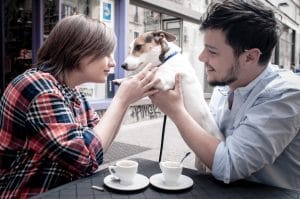
Even the most seasoned party goers among us feel a little apprehensive when walking into a room of complete strangers. It is much easier, and usually more rewarding, to meet someone for the first time in a small group or one to one. Your dog is no different, especially if he of she is new to social situations.
The first people to introduce to your dog are your family or people you see regularly. Your dog will see that you are relaxed in these people’s company and will hopefully relax as well. Do not force your dog to interact with them. This may take time and forcing the issue will be a backward step in your dog’s socialization process.
Again this is all down to building confidence in your dog and patience on your behalf will help with this. Once your dog begins to trust new people then you can introduce him or her to more social situations and people.
6. Dog Treats And Lots Of Praise
In some cases, your new dog’s first interaction with a new person is you. So, this needs to be a positive association. Most dogs and puppies respond well to dog treats and lots of praise, during training. It is a positive reward for good behaviour or the behaviour you are trying to achieve.
However, when training your pup or dog to be social, don’t be tempted to use treats or praise to reassure your dog when he or she is worried or nervous. This will only reinforce your dog’s feelings of fear and nervousness in certain situations. When you have removed your dog from the situation and he or she is calm and confident once again, this is the time for a dog treat and praise for your dog.
Don’t get confused with when to use treats and praise as this will definitely confuse your dog as well!
7. Dog Training Classes
This can be a very good way to socialize your puppy and especially an older dog.
So, what is a dog training class? A dog training class usually encompasses several different areas of dog training, one of which is socialization, with other dogs and owners. Be sure to investigate that the class you are both thinking of joining includes socialization skills. Your dog will also benefit by learning basic commands. Usually the classes will take place once a week, so choose a class that is at a time you will be able to attend every week. The professional trainer will be able to assess which class is best for both you and your dog.
There are also training classes specifically for puppies (and new puppy owners!) – puppy classes! This will be more appropriate for your young pup than a class of fully grown adult dogs.
There are many positives to be gained with dog or puppy training classes. Your dog will be concentrating on trying to understand new lessons and therefore distracted from all the dogs and people around him or her, eventually making being social normal. You will learn new ways to teach and understand your dog or puppy and in the learning process, make your bond stronger.
However, for this to be a positive and useful experience for both of you, it will involve homework!
8. Caution And Attentiveness
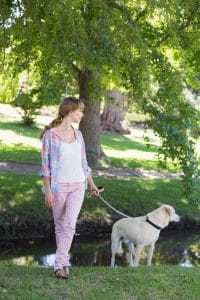
Only you will really understand your dog or pup after spending time with him or her. You will learn to read your dog’s body language to understand how he or she is feeling. So, use this knowledge to help your dog or puppy in difficult social situations or to avoid them altogether.
The goal is to have a confident best friend in all situations with other dogs and people, however this is not always possible. If you have tried encouragement, patience and time and there are still some social situations where your dog is uncomfortable, it is now your job to recognise these signs and be cautious. Don’t put your dog in a position that results in undesirable behaviour.
When out for a walk, visiting friends or any other social situation, look for the potential problem and try to avoid it. Your job in the partnership is to be thinking ahead and anticipating problems.
Conclusion
Most puppies are social little creatures and their natural inquisitiveness helps them to integrate with other dogs and people. Many more mature dogs will already be happy to be around new people and/or new dogs. However, this is not always the case.
So if you find yourself in the “this is not always the case” category, please do not give up on your new hound. Once again, patience, time and consistency are the key with dog training.
More importantly, the bond you build with your new best friend will give you both confidence in new and sometimes difficult social situations!